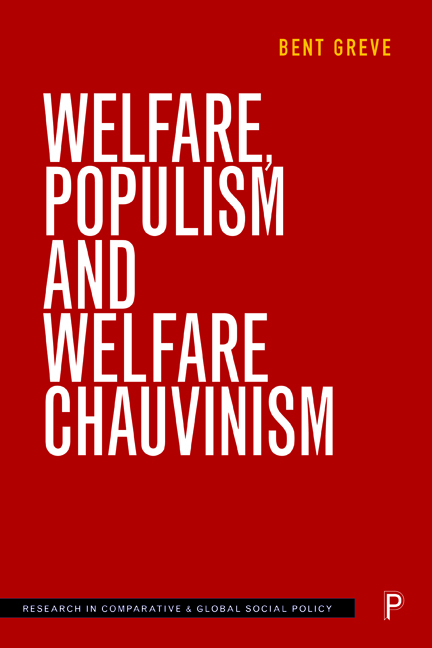Book contents
- Frontmatter
- Contents
- List of tables and figures
- Preface from the series editors
- Preface
- 1 What is it all about?
- 2 Basic concepts
- 3 Why inequality matters
- 4 Dualisation and the labour market
- 5 What form has the development in welfare spending taken?
- 6 Has social cohesion been eroded?
- 7 What do we know about citizens’ perception of the welfare state?
- 8 Populism, welfare chauvinism and hostility towards immigrants
- 9 Concluding remarks
- Index
8 - Populism, welfare chauvinism and hostility towards immigrants
Published online by Cambridge University Press: 27 April 2022
- Frontmatter
- Contents
- List of tables and figures
- Preface from the series editors
- Preface
- 1 What is it all about?
- 2 Basic concepts
- 3 Why inequality matters
- 4 Dualisation and the labour market
- 5 What form has the development in welfare spending taken?
- 6 Has social cohesion been eroded?
- 7 What do we know about citizens’ perception of the welfare state?
- 8 Populism, welfare chauvinism and hostility towards immigrants
- 9 Concluding remarks
- Index
Summary
Introduction
This chapter looks into the development in populism, welfare chauvinism and hostility towards immigrants in different welfare regimes. As depicted both in the theoretical chapters and in Chapter 7, it seems that attitudes towards those who, rightly or wrongly, are taking jobs and/or using the benefit system can help in the deeper understanding of populism and welfare chauvinism. Immigration has been the most important issue among citizens since 2014, except in early 2017, when terrorism was higher. Close to 40% overall, and in the second half of 2015, close to 60%, of survey respondents found that this was the most important issue. Before that, the financial crisis and economic development were more important (European Commission, 2018). Thus, there is a good reason to look into whether immigration also has an impact that can be related to populism.
In order to analyse the link between rising populism, anti-immigrant sentiments, welfare chauvinism and economic insecurity in Europe, we compare the development in six European countries (Germany, the UK, France, Hungary, Spain and Sweden), representing different welfare regimes. The chapter will analyse whether the rise in populism reflects growing welfare chauvinism and hostility towards immigrants and refugees. As the selected countries represent different welfare regimes and political systems, we will analyse varieties of welfare chauvinism and attitudes towards immigrants and a multicultural society. In the last part of the chapter, we will analyse to what extent perceived economic insecurity shapes opinions towards an outgroup such as immigrants, and whether we see a growing polarisation in attitude between the economically secure and the economically vulnerable and insecure. The chapter proceed by looking into the rise in populism, understood as support for populist parties, followed by looking into attitudes towards immigrants and refugees, and, finally, by looking at whether one can find traits towards welfare chauvinist opinions.
Rise in populism
Over previous decades, we have seen rising support for populist parties in many Western countries (see also Chapters 1 and 2). The mean voter share of populist Right parties has been increasing in most European countries. Figure 8.1 shows that in Sweden, Germany, Hungary and the UK, the vote share has increased over previous decades.
- Type
- Chapter
- Information
- Welfare, Populism and Welfare Chauvinism , pp. 137 - 152Publisher: Bristol University PressPrint publication year: 2019



